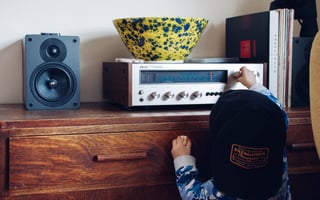Radio might lack the glamour of TV.
Get your earphones ready – we have launched a podcast.
The Media Landscape, presented by Julia Belle, combines a guide to the stories you need to know about with predictions and insight on those likely to be coming up on the news agenda.
And all this is squeezed into 15 minutes, once a week.
I met with Julia to learn more about the aims of the podcast and help you get to know its presenter.
“Hats off to people in PR and comms,” she told me. “I’ve definitely got a new respect for the job, having spoken to several people in the industry to research ideas for the podcast.
“One of the people I spoke to compared the job to a goalkeeper because you need to be aware of potential threats and opportunities coming from lots of different angles.
“And I think The Media Landscape can play a part in helping them to do that.”
Although the podcast just launched this week, you may well already be familiar with Julia’s voice. She has a regular slot on BBC Radio 5 Live. She also created and presents the Bare Naked Politics podcasts – a show about politics for people who don’t like politics, nominated for a British Podcasts Award this year.
If you’ve been reading our media training blogs, you’ll know we’ve been talking more regularly about the boom in podcasts.
Around 15 million people in the UK now listen to the podcasts, and there are predictions the figure will reach 20 million by 2024.
And they have plenty of choice, with more than two million podcasts available.
So, where does The Media Landscape fit into this, and what makes it different?
“When James (Media First managing director James White) first spoke to me about a Media First podcast, he said he loved that Bare Naked Politics was conversational and relaxed.
“What he feels is missing at the moment is a podcast for people in PR and comms, who live and breathe the news because they know it can impact their organisation.
“So, with the podcast, we are looking at what is happening in the news. But also what is coming up that organisations could be asked about.
“We did quite a bit of market research, and I spoke to PR managers who said they wanted a broad summary of the news but also want to know what is around the corner.”
Much of that news forecasting comes during a segment called Journo On The Go, where Julia speaks to a reporter about the stories they think could be coming up.
Julia said: “I think there are two beautiful components of the podcast. Firstly, it is 15 minutes long, because we know the people listening are time-poor. And secondly, our Journo On The Go section. Here we not only look at what journalists are reporting on now but also what they are planning.
“That section means they can offer a steer to our audience.”
Julia’s ambition is to create a roster of around 12 regular contributors for this section willing to share their insight.
“I like a bit of consistency,” she said. “My goal is that once we have been going for a bit, people know that if the big story is health, then they expect to hear from this person. I’d like there to be a roster of around 10-12 familiar voices so that it becomes a bit of a family.
“One of my gripes with some podcasts is you don’t feel you know the people you are listening to. And when people are dedicating time to listening to us, I want them to think, ‘I trust these guys - I’ve listened to them before’.
“It is also vital for me to build a relationship with each of the 'journos on the go', so they trust me and the questions I am asking. Because, essentially, their guard is down, and they are telling us what they are working on over the next few weeks – not every journalist would be willing to do that.
“These journalists won’t be able to say, ‘I’m definitely working on these stories this month’. They may have to completely change direction. But it is still helpful to hear what they are planning.
“I spoke to a political journalist in one of the pilot episodes who said, ‘I don’t know if Brexit is going to mess Christmas up, I don’t know if it is going to mess up supply chains. But I feel like it might, so I am going to plan accordingly’. Even if that story doesn’t happen, it is good for PRs to know what journalists are thinking.”
One of the things that fascinates me about the podcast is how the week’s events and predictions for the future can be condensed into 15 minutes.
The world appears to be in a permanent state of flux, and the news seems to move quicker than ever. How does Julia choose the stories to focus on?
“It is ambitious, in that we want to cover a lot of bases in a short amount of time,” Julia said. “But it is totally doable and we want to be the ones to do it.
“There are a few of us working on ideas for the podcast, and collaboratively, we come up with the stories that matter and that are relevant to the audience.
“I don’t delve too deep. But I cover it enough so that anyone listening to the podcast who has been on holiday for a month will feel they have caught up.
“We are not magicians. We can’t condense an entire landscape into 15 minutes. But what we can do, is make you feel like you have read all of the front pages. So, if you’ve been away or been really busy, and need to go straight into a meeting, you can at least hold a five-minute conversation about what is going on.”
Let’s face it, the news agenda is often pretty bleak, with covid and Brexit often dominating the coverage. You might think then that the podcast could sound heavy and serious.
Having heard the pilot episodes, humour and entertainment are also injected into each episode.
“We forget the people making the decisions that end up with things being in the news are human beings,” she said. “In every working environment, if there are humans, then there is humour.
“A lot of the mistakes that result in this doom and gloom can be traced back to a little error, misjudgement or groupthink (a phenomenon where the desire for group cohesion effectively drives out good decision-making and problem solving). I’m fascinated by the idea of groupthink and that you can have the best people in a room, but if there is no one there to challenge them, they go down the wrong path.
“As soon as people listen, I think they will realise that just because someone is in Downing Street, it doesn’t mean they are not human.
“The last two years have been difficult, and you have to offer enough respect for the subjects you are talking about. But you can put people off from caring at all if there is no humour.”
I finished our chat by asking Julia to sum up what people can expect from listening to the podcast.
“With this podcast, we are not trying to tell people how to do their jobs,” she said.
“They know, better than I do, how to do their jobs. What they don’t necessarily have time to do, is work out what is going on all of the time.
“So, while they will be able to handle what the journalists are asking them, it might be nice for them to have a steer on what is coming up.
“You are not necessarily going to get loads of tricks and tips on these podcasts, although sometimes we may touch on them.
“But, if you’ve missed a beat and just need to catch up through the lens of your job capacity, this is the podcast.”
The Media Landscape is produced by our sister company Thirty Seven. Find out how they can help you create a podcast for your brand.
Media First are media and communications training specialists with over 35 years of experience. We have a team of trainers, each with decades of experience working as journalists, presenters, communications coaches and media trainers.
Subscribe here to be among the first to receive our blog.




